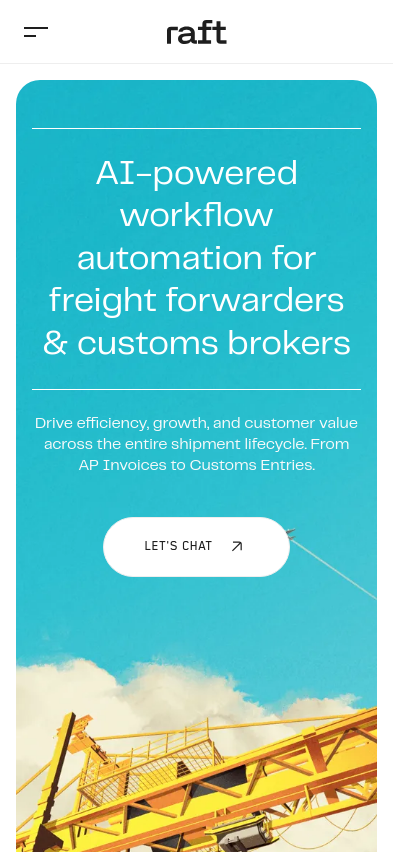⚡ZurzAI.com⚡
AI Start Ups Your Should Know
Raft

Raft provides AI-powered workflow automation tailored for freight forwarders and customs brokers. Their platform aims to improve efficiency across the shipment lifecycle, focusing on tasks such as AP Invoices and Customs Entries.
Raft is a company that offers AI-powered workflow automation solutions aimed at freight forwarders and customs brokers. Their platform centralizes operations and integrates with existing systems to improve efficiency and accuracy throughout shipment lifecycles. The company's solutions cover areas like platform management, AP invoicing, customs entries, and general operations.
Main Offerings:
-
AI-Powered Automation: Raft provides technology that automates administrative tasks in logistics, streamlining processes and reducing manual data entry. Their solutions span finance, customs, and operational management.
-
AP Invoices: Raft's zero-touch invoice automation allows users to manage accounts payable processes efficiently. The system integrates with Transportation Management Systems (TMS) and other platforms to reduce manual intervention, improve data accuracy, and save significant time.
-
Customs Entries: The customs entry feature automates the preparation of declarations at high speed, ensuring compliance while reducing the time spent on manual data processing. The technology extracts and validates data from various documents, allowing customs experts to focus on more critical issues.
-
Comprehensive Platform: Raft's platform is designed to enable freight forwarders to manage all data, documents, and workflows centrally. It offers seamless integration with a wide range of systems and facilitates cross-team collaboration through features like audit trails and exception management.
Technological Approach:
-
Use of AI: Raft employs advanced AI models trained on vast datasets to enhance decision-making and process automation. Their technology includes features like reinforcement learning from human feedback, allowing continuous improvement of system accuracy.
-
Customizable Solutions: The platform is highly configurable, allowing users to tailor data workflows according to specific business needs. This adaptability is driven by tools like the no-code workflow editor that enables the creation of custom automations without needing extensive technical expertise.
Customer Impact:
-
Case Studies: The platform's impact is exemplified through case studies with companies such as Navia Freight, Masterpiece International, and The Scarbrough Group. They have reported significant reductions in manual labor, quicker processing times, improved operational efficiency, and substantial cost savings.
-
Return on Investment: By automating repetitive tasks, Raft helps companies cut labor costs and focus on strategic initiatives. The company claims that automating workflows can lead to significant annual savings, with users gaining on average 2,000 extra hours a month for strategic tasks rather than mundane data entry.
Global Reach and Customer Support:
-
Wide Adoption: Raft claims to support freight forwarders globally, working across numerous industries and countries. The platform processes millions of shipments yearly for both small businesses and large-scale operations, such as those in the Automotive, Pharmaceutical, and Retail industries.
-
24/7 Support: The company ensures continuous customer assistance through support teams spread across Asia, Europe, and North America.
Organizational Goals and Future Directions:
-
Technological Evolution: Raft is committed to evolving its platform to keep pace with emerging challenges in logistics, such as new trade tariffs, by harnessing AI's capabilities to handle increased complexity in supply chain operations.
-
Vision for Industry Collaboration: The company seeks to drive a more collaborative industry environment through their technological solutions, enabling different stakeholders to scale together by speaking a common digital language.
Overall, Raft aims to optimize logistical processes through automation, simplifying the complex landscape of global supply chain operations for their clients.